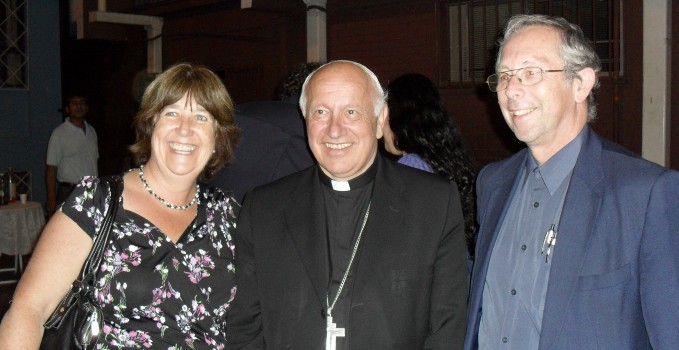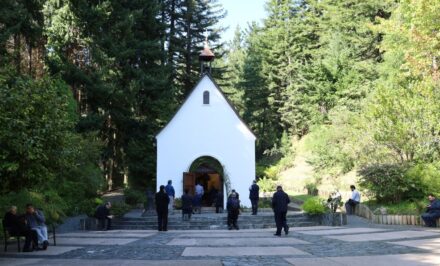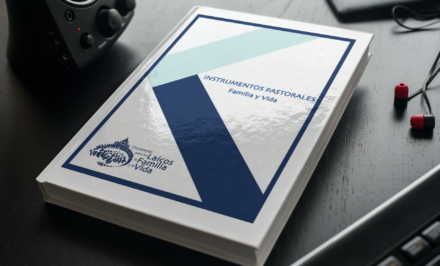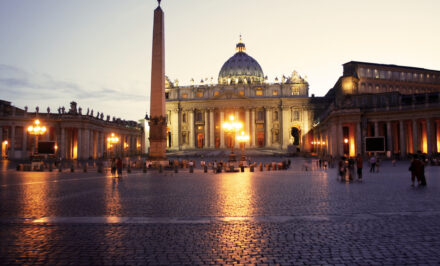Chile, by Bárbara Brain •
From the title to daily practice, things changed in the Santiago Church last April with the appointment of a couple to a post that is usually occupied by a priest. The Family Pastoral vicariate is presently the “episcopal delegates” – yes, plural – for the Family Pastoral, and it is no long the vicariate, but the Episcopal Delegation in this field, although its function and status remain intact. José Manuel Borgoño and Mónica Undurraga are the couple in charge of this task. They have been married for 41 years; they are the parents of six children, 5 grandchildren, and they are also militant members of the Schoenstatt Family Branch in Santiago – Cordillera.
A feminine voice heard for the first time in the vicars’ meetings of the Santiago Church is just a symbol of what Mónica defined as “a tremendous opening and opportunity for the laity.” The excellent reception that both have received from the rest of the vicars (17 among areas and specific ones) indicate that the new Church is taking concrete steps in this direction.
The presence of Borgoño and Undurraga has also caused great acceptance among the pastors and pastoral representatives. Closeness is felt from their presence, their experience, the complementarity of man and woman and their warm openness in speaking.
Our objective is to reach all those who live as a family 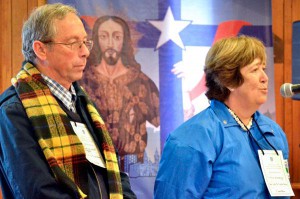
The task that they face is enormous. The reality of Catholic families in Chile would leave Saint Alberto Hurtado pale if he received an answer to his “Is Chile a Catholic country?”
Of the total marriages carried out civilly, approximately 60,000 per year, the Church carried out only 20% to 30% of these. Moreover it should be understood that the same number or larger, than those who marry civilly, are couples living without any formal commitment.
But Borgoño and Undurraga do not shy away. “It is not about a Church crisis or anything like that,” José Manuel affirms. “This generation has understood that married life is not easy and that the possibility of failure is high, so some prefer ‘to try it’ first without papers, or perhaps with papers that can be dissolved if this is what they decide in the future. Since the sacrament is forever, then, they do not undertake it… The numbers have to be seen as a process, because many of those who co-habit are the ones who will later marry civilly and sometimes will also marry by the Church.”
They not only do not shy away, instead they also aspire to the highest purpose: “Our objective is to reach all those who live as a family without any identification, so that everyone may live fully and that they may know Christ, the person, and that they understand it is the way to want to a more fulfilled life. Our objective is to accompany these families and to motivate them to experience a domestic Church that will spread to others,” Mónica explains.
A work that is body-to-body
And in the first place, they establish a road that begins with marriage preparation that it is not only the concept for an engaged couples’ course, but for supporting people from childhood and youth that allows them to always aspire to a model of a fulfilled life, which, in the case of families, is reached through the Sacrament of Matrimony. “During the courtship they can be given the necessary tools to build this future in communion with grace, but the work should begin long before,” Mónica clarified.
Then they hope the work of the accompaniment of families, who are already formed, will follow and then be given to the parish. In it the pastoral agents are trained, families, who at the same time can influence other families and thus generate a wave that fills the hearts of many, awakening the desire of the soul for a better life.
Aware of the reality, they know that the task is slow, as Pope Francis would say of a body-to-body work, and that the family should carry out as the domestic church. José Manuel summarized the four lines of action of this small evangelizing church: the family is who shares (transmits the faith); it celebrates (God’s passing through their own history); it serves (inwardly as well as its surrounding); and it is communitarian (it teaches to live in community).
From Father Kentenich’s “Dilexit Ecclesiam”
So the invitation is to be and to form a family, to save our own charism. It is an invitation that is extended to all Christian movements and Schoenstatt in particular, to work in what we know and what is our own. By trying to live as domestic churches in the missionary and broadest sense, we are rowing to the right side. Beneath the same umbrellas of the Church and of the parish, the pastoral delegates call us to inspire all the members of our movements to participate in pastoral units that exist (schools, parishes, foundations, etc.) to train ourselves with more awareness as Christians, and thus, as pastoral agents to share our models of work and our pedagogical methodologies in places where we carry out an apostolate, and to place ourselves at the disposal of a coordinated work with other pastoral representatives.
For Schoenstatt, the invitation is also direct, “To continue to work at the service of the Church with as much love as we have to now to be that heart of the Church like Father Kentenich wanted. The parishes especially need us,” José Manuel said. “The Church has opened the door for us.”
Source: Vínculo, National magazine of Chile, May 2015
Original: Spanish. Translation: Celina M. Garza, San Antonio, TX USA


